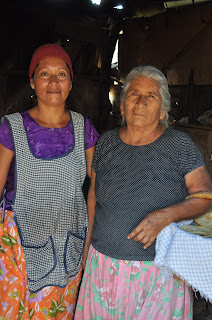 |
| Each tortilla ...is a tasty round of applause... for the sun (Francisco Alarcón) |
Reina de la Cruz is a totopera. She is a thirty six year-old, single mother with two adolescent children and a mother who is ill. She has been making totopos for fifteen years. Six days a week she rises at dawn to prepare the fire in her earthen oven in the back of her yard. When the temperature is “just right”, she mixes her corn masa, forms it into perfectly round tortillas, and slaps them on the sides of her oven to cook “just the right” amount of time. “Es el trabajo de todos los días”, she told me, everyday work.

The work she does is time consuming and the income that it generates is very meager.
The price of corn rose a few years ago and it has made selling her totopos difficult. Her totopos now sell five to eight for ten pesos. Tortillas de kilo (sold by weight) cost fourteen pesos for thirty tortillas. The ancient food of the zapotecos is becoming unaffordable for many local families. And this makes the economic survival of artisans like Reina difficult.
 |
| Reina & her mother, Maria |
 But she regrets the fact that people don’t value the work she does. "They don’t want to pay the price that
the work deserves.” So to supplement her income,
she weaves. It was something she always wanted to do as a child and was
able to take classes when she was younger. She weaves after dinner sometimes if
she has the energy. Otherwise it is on Sunday, her day of rest, when she can
work on a huipil. “Es muy pesado el trabajo” (it is really hard work), she tells
me. The huipiles from Juchitán are very ornate and exquisite. They take a long
time to make, especially if you are making totopos ten hours a day. It takes Reina a week to ten days to finish a huipil when she is working on it full time. And unless it is a commission, there is no income until it sold.
But she regrets the fact that people don’t value the work she does. "They don’t want to pay the price that
the work deserves.” So to supplement her income,
she weaves. It was something she always wanted to do as a child and was
able to take classes when she was younger. She weaves after dinner sometimes if
she has the energy. Otherwise it is on Sunday, her day of rest, when she can
work on a huipil. “Es muy pesado el trabajo” (it is really hard work), she tells
me. The huipiles from Juchitán are very ornate and exquisite. They take a long
time to make, especially if you are making totopos ten hours a day. It takes Reina a week to ten days to finish a huipil when she is working on it full time. And unless it is a commission, there is no income until it sold.When I left Reina's house that day I left with a huipil for Quena and 25 totopos to share wit my good friends at the Casa de la Cultura de Juchitán who made these photo sessions possible. And I told her I might come back someday with my son, Joa, who just happens to be 36 as well. And..... he like tortillas!



3 comments:
I love reading your essays and always feel that I have learned something new and important--so thank you. I look forward to seeing these collected in a book eventually.
On a side note, Greg and I got home from our trip to the Canadian Rockies yesterday. It will take a while to catch up, but then we'll get in touch so we can have time together.
As all your posts this is beautiful and inspiring.
I treasure our friendship, and all I have and continue to learn from you. My best to four family. Un fuerte abrazo
Deek,
Nicely done! My mouth is watering for a hand spanked tortilla. I feel guilty for saying so in Toulouse with all the hand made croissants spilling out of artisan bakeries. I could read your blogs forever! They give tribute to the everyday artist. Individuals who keep alive their culture one bite at a time. Keep up the writing amigo! ~Shawna
Post a Comment